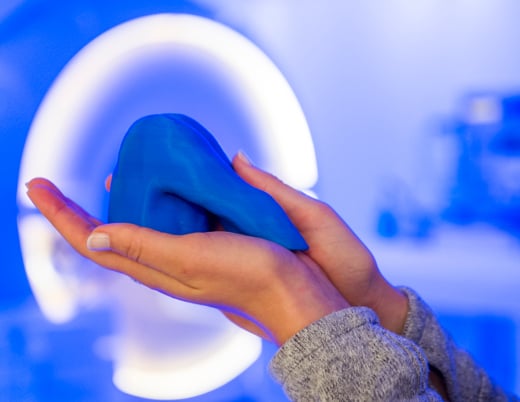Key takeaways
-
This is the first report of a clinically actionable pharmacogenomic-guided prenatal drug therapy for fetal long QT syndrome (LQTS) and torsades de pointes, a rare, life-threatening cardiac condition.
-
Management by our cardio-obstetrics team enabled tailored prenatal therapy, including precise medication dosing for the mother and fetus, resulting in a term delivery with a normal rhythm.
-
Without In utero treatment for the underlying LQTS, the fetus would not have survived.
-
Prenatal personalized medicine can minimize drug toxicity, enhance efficacy for fetuses with arrhythmias and benefit those exposed to drugs for maternal conditions.
Research study background
This case report details the first documented use of pharmacogenomic testing for the treatment of prenatal long QT syndrome (LQTS) in utero, as part of a multidisciplinary cardio-obstetrical approach introduced at the Colorado Fetal Care Center at Children’s Hospital Colorado and the University of Colorado School of Medicine.
A healthy pregnant patient was referred to the Colorado Fetal Care Center at 32 weeks’ gestation with fetal hydrops and a complex fetal arrhythmia with tachycardia and bradycardia. To determine the differential diagnosis in the fetus, the team tested for anti-Ro/SSA antibody–mediated fetal cardiac disease and LQTS, reviewed family history, evaluated the parents’ electrocardiograms and performed a fetal echocardiogram. The family history was negative for inherited arrhythmia syndrome symptoms and the echocardiograms were normal. The fetal echocardiogram indicated a pathogenic LQTS variant, suggesting torsades de pointes (a life-threatening abnormal heart rhythm), atrioventricular block and sinus bradycardia.
The patient was admitted and managed by a cardio-obstetrical team of maternal-fetal medicine specialists, fetal cardiologists, geneticist/genetic counselor, a pharmacologist and a pharmacogeneticist. Pharmacogenomic testing evaluated the mother’s blood for anticipated transplacental LQTS medications and a cardiac arrhythmia panel and pharmacogenomic testing was performed on amniotic fluid. While awaiting pharmacogenetic results, the pregnant patient was given intravenous magnesium sulfate for suspected fetal LQTS, restoring sinus rhythm within 24 hours, and low doses of short-acting propranolol and mexiletine. The fetus was determined to be at risk for poor outcomes from proarrhythmic drug toxicities and in utero demise from the underlying LQTS and was also found to harbor a de novo KCNH2 mutation (a LQTS gene).
After five weeks of treatment, a female infant was delivered at term in sinus rhythm. An electrocardiogram performed 10 days after birth found an intermittent accelerated idioventricular rhythm with a left bundle branch morphology and a normal QRS axis. The team ultimately decided to place an internal cardiac defibrillator when the patient was 3 months old, and she was soon discharged home with continued propranolol and mexiletine.
Clinical implications
The multidisciplinary team approach optimizes care by integrating expertise in conception planning, pregnancy and peripartum management. Regular meetings with the patient and care team help develop tailored strategies, improving outcomes for mother and fetus. The genetic specialist guides prenatal genetic testing, offering insights into recurrence risks in future pregnancies. Pharmacologists and pharmacogeneticists ensure precise dosing of transplacental medications, minimizing toxicities considering maternal and fetal pharmacogenomic status. In utero application of pharmacogenomics enhances drug efficacy and safety, crucial since fetal drug toxicity remains undetectable through conventional monitoring methods like ultrasound or fetal heart rate assessment.
The team is creating an in vitro model to assess the efficacy of various treatments based on these prenatally-obtained samples. Their goal is to utilize the model to first trial new medications when the need arises.
Featured Researchers

Manesha Putra, MD
Maternal fetal medicine specialist
Children’s Hospital Colorado
Assistant professor
Ob/Gyn-Maternal Fetal Medicine
University of Colorado School of Medicine

Emily Bucholz, MD
Fetal and pediatric cardiologist
Colorado Fetal Care Center
Children’s Hospital Colorado
University of Colorado School of Medicine
Assistant Professor
Pediatrics-Cardiology

Henry Galan, MD
Maternal Fetal Medicine Specialist
Colorado Fetal Care Center
Children's Hospital Colorado
Professor
OB-GYN-Maternal Fetal Medicine
University of Colorado School of Medicine
Nicholas Behrendt, MD
Maternal fetal medicine specialist
Children’s Hospital Colorado
Associate professor
Ob/Gyn-Maternal Fetal Medicine
University of Colorado School of Medicine

Michael Zaretsky, MD
Director of Research
Colorado Fetal Care Center
Children's Hospital Colorado
Professor
OB-GYN-Maternal Fetal Medicine
University of Colorado School of Medicine

Frank Chow, MD
Lead Ob/Gyn Hospitalist
Colorado Fetal Care Center
Children’s Hospital Colorado
Sr. Instructor
OB-GYN-Gyn and OB Health
University of Colorado School of Medicine





 720-777-0123
720-777-0123










